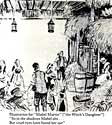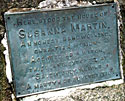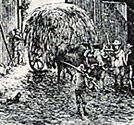
Mabel Martin
 In 1857 Whittier wrote an early version of “Mabel Martin” called “The Witch’s Daughter. It was published in the Era and consisted of what was later to be Parts II-V of “Mabel Martin.” The story was a fictional account of the marriage of Ezekiel Worthen (Handen in the poem) and Hannah Martin (Mabel in the poem), step-daughter of Susanna Martin of Amesbury who was hanged for a witch in 1692. Actually Ezekiel Worthen married Hannah Martin in 1661, thirty-one years before Susanna’s trial and execution.
In 1857 Whittier wrote an early version of “Mabel Martin” called “The Witch’s Daughter. It was published in the Era and consisted of what was later to be Parts II-V of “Mabel Martin.” The story was a fictional account of the marriage of Ezekiel Worthen (Handen in the poem) and Hannah Martin (Mabel in the poem), step-daughter of Susanna Martin of Amesbury who was hanged for a witch in 1692. Actually Ezekiel Worthen married Hannah Martin in 1661, thirty-one years before Susanna’s trial and execution.
In 1874 Whittier’s publishers suggested an illustrated edition of “The Witch’s Daughter” and he agreed to add some eighty lines which would be “full of pictures.” (Woodwell 398).
Mabel Martin: A Harvest Idyl
Whittier begins with an introductory note.
Susanna Martin, an aged woman of Amesbury, Mass., was tried and executed for the alleged crime of witchcraft. Her home was in what is now known as Pleasant Valley on the Merrimac, a little above the old Ferry way, where, tradition says, an attempt was made to assassinate Sir Edmund Andros on his way to Falmouth (afterward Portland) and Pemaquid, which was frustrated by a warning timely given. Goody Martin was the only woman hanged on the north side of the Merrimac during the dreadful delusion. The aged wife of Judge Bradbury, who lived on the north side of the Powow River, was imprisoned and would have been put to death but for the collapse of the hideous persecution.
Part I, added in 1874, sets the scene in Amesbury.
I. The River Valley
Across the level tableland,
A grassy, rarely trodden way,
With thinnest skirt of birchen sprayAnd stunted growth of cedar, leads
***
To where you see the dull plain fall
Sheer off, steep-slanted, ploughed by all
The seasons’ rainfalls.Here in the dim colonial time
Of sterner lives and gloomier faith,
A woman lived, tradition saith,Who wrought her neighbors foul annoy,
And witched and plagued the countryside,
Till at the hangman’s hand she died.
From a general description of the area, the poem moves to focus on the young farm workers who have come to the barn of Esek Harden to do some husking.
II. The Husking
It was the pleasant harvest-time,
When Cellar-bins are closely stowed,
And garrets bend beneath their load,And the old swallow-haunted barns,--
***
Brown-gabled, long, and full of seams
Through which the moted sunlight streams.And thither came young men and maids,
***
Beneath a moon that, large and low,
Lit that sweet eve of long ago.And jests went round, and laughs that made
***
The house-dog answer with his howl,
And kept astir the barn-yard fowl;
III. The Witch’s Daughter
But still the sweetest voice was mute
That river-valley ever heard
From lips of maid or throat of bird;For Mabel Martin sat apart,
And let the hay-mow’s shadow fall
Upon the loveliest face of all.She sat apart as one forbid,
Who knew that none would condescend
To own the Witch-wife’s child a friend.The seasons scarce had gone their round,
Since curious thousands thronged to see
Her mother at the gallows-tree;And mocked the prison-palsied limbs
That faltered on the fatal stairs
And wan lip trembling with its prayers!
.IV. The Champion
So in the shadow Mabel sits;
Untouched by mirth she sees and hears,
Her smile is sadder than her tears.But cruel eyes have found her out,
And cruel lips repeat her name,
And taunt her with her mother’s shame

Mabel puts her apron over her face and glides out, passing Esek Harden at the door.
Esek speaks up for Mabel
“Good neighbors mine,” he sternly said,
“This passes harmless mirth or jest’
I brook no insult to my guest,“She is indeed her mother’s child,
But God’s sweet pity ministers
Unto no whiter soul than hers.”V. In the Shadow
Mabel, having gone home, tries to pray.
Poor child! The prayer, begun in faith,
Grew to a low, despairing cry
Of utter misery: “Let me die!“Oh! Take me from the scornful eyes,
And hide me where the cruel speech
And mocking finger may not reach!”
VI. The Betrothal
Esek appears at her cottage and proposes to her.
“You know rough Esek Harden well;
And if he seems no suitor gay,
And if his hair is touched with gray,“The maiden grown shall never find
His heart less warm than when she smiled,
Upon his knees a little child!”
She accepts, and then he leads her back to the barn to tell everyone she is to become his wife.
“Good friends and neighbors!” Esek said
“I’m weary of this lonely life’
In Mabel see my chosen wife!And nature gives its approval.
Oh, pleasantly the harvest-moon,
Between the shadow of the mows,
Looked on them through the great elm-boughs!On Mabel’s curls of golden hair,
On Esek’s shaggy strength it fell’
And the wind whispered, “It is well!”

Full text of "Mabel Martin"


